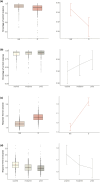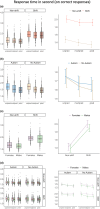Cognitive flexibility in autism: How task predictability and sex influence performances
- PMID: 39635938
- PMCID: PMC11826006
- DOI: 10.1002/aur.3281
Cognitive flexibility in autism: How task predictability and sex influence performances
Abstract
While cognitive flexibility challenges are frequently reported in autistic individuals, inconsistencies in the findings prompt further investigation into the factors influencing this flexibility. We suggest that unique aspects of the predictive brain in autistic individuals might contribute to these challenges, potentially varying by sex. Our study aimed to test these hypotheses by examining cognitive flexibility under different predictability conditions in a sample including a similar number of males and females. We conducted an online study with 263 adults (127 with an autism diagnosis), where participants completed a flexibility task under varying levels of predictability (unpredictable, moderately predictable, and predictable). Our results indicate that as task predictability increases, performance improves; however, the response time gap between autistic and non-autistic individuals also widens. Moreover, we observe significant differences between autistic males and females, which differ from non-autistic individuals, highlighting the need to consider sex differences in research related to the cognition of autistic individuals. Overall, our findings contribute to a better understanding of cognitive flexibility and sex differences in autism in light of predictive brain theories and suggest avenues for further research.
Keywords: autism; cognitive flexibility; gender differences; predictive brain; sex differences.
© 2024 The Author(s). Autism Research published by International Society for Autism Research and Wiley Periodicals LLC.
Conflict of interest statement
The authors declare no conflicts of interest.
Figures




References
-
- American Psychiatric Association . (2013). Diagnostic and statistical manual of mental disorders (DSM‐5). American Psychiatric Pub.
-
- Ashwood, K. , Gillan, N. , Horder, J. , Hayward, H. , Woodhouse, E. , McEwen, F. , Findon, J. , Eklund, H. , Spain, D. , Wilson, C. E. , Cadman, T. , Young, S. , Stoencheva, V. , Murphy, C. , Robertson, D. , Charman, T. , Bolton, P. , Glaser, K. , Asherson, P. , & Murphy, D. (2016). Predicting the diagnosis of autism in adults using the autism‐spectrum quotient (AQ) questionnaire. Psychological Medicine, 46, 1–10. 10.1017/S0033291716001082 - DOI - PMC - PubMed
-
- Baron‐Cohen, S. , Wheelwright, S. , Skinner, R. , Martin, J. , & Clubley, E. (2001). The autism‐spectrum quotient (AQ): Evidence from Asperger syndrome/high‐functioning autism, males and females, scientists and mathematicians. Journal of Autism and Developmental Disorders, 31(1), 5–17. 10.1023/A:1005653411471 - DOI - PubMed
Publication types
MeSH terms
Grants and funding
LinkOut - more resources
Full Text Sources
Miscellaneous

